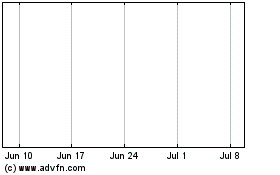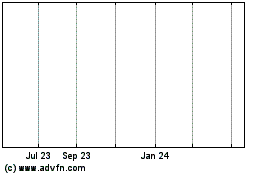South Korea's Top Court to Rule on Bribery Cases Tying Samsung Heir and Ex-President
August 29 2019 - 12:18AM
Dow Jones News
By Timothy W. Martin
SEOUL--South Korea's Supreme Court will rule Thursday on cases
involving Samsung's de facto leader and the country's imprisoned
former president, two proceedings that intersect in a bribery
scandal that shook the nation.
The country's highest court will issue a ruling on the separate,
though intertwined, cases of Lee Jae-yong, the 51-year-old grandson
of Samsung's founder, and former President Park Geun-hye, 67, the
conservative daughter of a past dictator. Both face a variety of
charges, though the central matter revolves around the Samsung
scion's bribes to Ms. Park.
The two cases, which were previously heard in lower courts, are
the most high-profile legal proceedings in an influence-peddling
affair that rocked South Korea starting in late 2016. A populist
backlash toppled Ms. Park's government.
The Supreme Court will decide by a majority vote whether to send
either case back to an appeals court for a new hearing or uphold
the appeal court's earlier decision. For Mr. Lee, the appeals
court's ruling sprung him from prison after nearly a year behind
bars, reducing his original five-year sentence to a suspended
sentence. Ms. Park is appealing a 25-year prison term and a fine of
roughly $16.5 million.
Both have previously denied wrongdoing and pleaded not
guilty.
If the Supreme Court sends the case back, Mr. Lee could again
face imprisonment if he loses. The earlier appeals-court decision
in February 2018, surprised many legal experts, as the judge added
up Mr. Lee's bribes differently from other related cases, including
Ms. Park's.
Samsung, one of the world's largest business enterprises, spans
dozens of affiliates selling life insurance, consumer electronics
and biopharmaceuticals. Each has its own CEO and management team.
But major strategic shifts or large mergers can't proceed without
Mr. Lee's signoff, a vestige of South Korea's family-run
conglomerate system.
Samsung has faced significant challenges recently, as its home
country spars with Japan in a trade fight that threatens core
business lines. The U.S.-China trade war has reduced consumer
spending globally.
Ms. Park, who in 2013 became the country's first female leader,
is one of four South Korean presidents to spend time behind bars.
Across three cases, she has been convicted of coercion, abuse of
power and taking off-the-books payment from South Korea's spy
agency, among more than a dozen other charges.
The Supreme Court ruling is expected to focus on three meetings
between Ms. Park and Mr. Lee starting in late 2014.
Mr. Lee needed government support--including a swing vote by the
country's national pension--to seal a deal that would cement his
grip on Samsung Electronics, prosecutors said. Two Samsung
affiliates were merging, but foreign shareholders were vehemently
opposed.
Ms. Park's predecessors have also faced legal problems. Two
former military-backed presidents who ruled South Korea from 1980
to 1993, were imprisoned over treason and corruption, though
received pardons. Lee Myung-bak, who served from 2008 to 2013,
spent nearly a year in jail over corruption charges before posting
bail earlier this year.
All 13 judges in South Korea's Supreme Court are expected to
attend Thursday's hearing, local media reported. Eight of them were
appointed by Moon Jae-in, the country's left-leaning president who
took office in May 2017 after winning a snap election following Ms.
Park's ouster.
Na-Young Kim and Eun-Young Jeong contributed to this
article.
Write to Timothy W. Martin at timothy.martin@wsj.com
(END) Dow Jones Newswires
August 29, 2019 00:03 ET (04:03 GMT)
Copyright (c) 2019 Dow Jones & Company, Inc.
Samsung Electronics (PK) (USOTC:SSNHZ)
Historical Stock Chart
From Mar 2024 to Apr 2024

Samsung Electronics (PK) (USOTC:SSNHZ)
Historical Stock Chart
From Apr 2023 to Apr 2024
